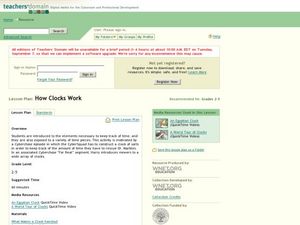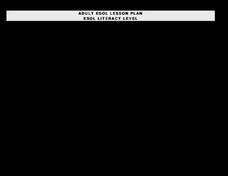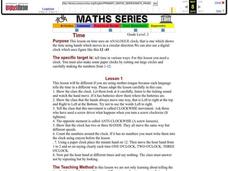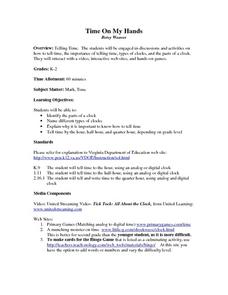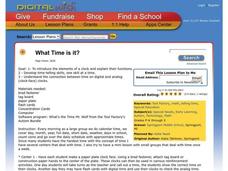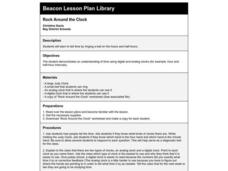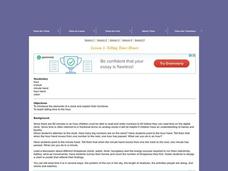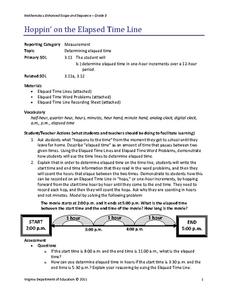Curated OER
It's About Time!
Students examine concept of time, and explore difference between analog and digital clocks; students make art project to represent time and create a time-story problem and solution.
Curated OER
How Clocks Work
Students discover time pieces and complete telling time activities. In this time lesson, students complete a worksheet about what make a clock keep time. Students watch a video about time and clocks as well as a video about an Egyptian...
Curated OER
Telling Time With Clocks/Bingo “Time”
Young learners create a clock by adding hands and placing the numbers in the correct location. After each learner has their very own clock, they explore each component. Review on the hour times, and then introduce them to five-minute...
Curated OER
What Time Is It?
Fourth graders distinguish between analog and digital clocks and read time from both types. In this clock reading lesson, 4th graders discuss the types of clocks and the time zones. Students find times in specific time zones. Students...
Curated OER
ESOL: Time and Money
Students study the parts of an analog and digital clock. They create paper clocks to identify telling time to the hour, half-hour, and quarter past and quarter after. They practice tellng time in pairs.
Curated OER
Time
Here, learners review telling time using an analog clock. They use a clock to tell time, make a paper clock, and discuss the concept of elapsed time. However, the lesson is not always easy to follow, nor are the questions clear.
Curated OER
Time On My Hands
Young learners engage in discussions and activities on telling time, different types of clocks, and how the parts of a clock actually work. The engage in interactive websites, hands-on games, and watch a video on the art of the clock and...
Curated OER
Telling Time as an Everyday Use of Numbers
How can we estimate time? Have your young mathematicians make a clock. Then they compare and contrast types of clocks. They practice writing times in two different ways and make a book about telling time.
Curated OER
Clocks and Time
Second graders observe and demonstrate how to tell and write time. They discuss different ways and things that tell time, then listen to a teacher-led lecture about the hands on a clock. Students complete a worksheet along with the...
Curated OER
Time: How To Tell What Time It Is
Learners practice telling time using analog and digital clocks. In this time telling lesson, students read the book The Grouchy Ladybug by Eric Carle, and practice telling the time on a model clock that is constantly changing....
Curated OER
My Time Book
First graders write a time book. In this writing and telling time lesson, 1st graders learn about the concept of time using a Judy clock. Students read a book about a ladybug and look closely at the time on the clock. Students then...
Curated OER
What Time is it?
Young scholars participate in three centers focused on developing time-telling skills. In this time lesson, students create their own paper plate clock face, play "Time Concentration" using times on the hour and half hour, as well as,...
Curated OER
Introduction to Hours & Minutes
First graders identify, interpret, and gain proficiency in using a clock to tell time to the hour and determine how many minutes are in an hour. They identify and list what they do as they travel through their dayand how much time you...
Curated OER
Telling Time
Young learners participate in activities which help them understand analog clocks, and the vocabulary of telling time. They examine the values of the intervals of minutes and hours by making a human clock.
Curated OER
Rock Around the Clock
First graders use a Judy Clock to learn time to the hour and half hour. They practice by ringing a bell and telling the time. They complete an activity sheet after practicing for several days.
Curated OER
Elapsed Time and Scheduling
Learners improve their time management by watching a video segment of a busy student making a schedule. In this elapsed time and scheduling activity, students create their own schedules and learn to calculate elapsed time in both digital...
Perkins School for the Blind
Familiar Sounds
To foster concept development and auditory discrimination skills, learners with visual impairments listen to identify a variety of common sounds. The teacher makes recordings of various sounds, including those found in the home, at the...
Curated OER
An Encyclo-ME-dia for Every Child
Learners create a digital scrapbook that shows information-text and pictures that are specific to each child. They make charts and graphs. They use digital cameras, scanners, software, to write captions, stories, poems, letters, and...
Curated OER
Telling Time: Hours
Students participate in a discussion about the different types of timepieces and the energy sources necessary to run them. They observe the numbers on a clock and review the hands and what they mean and make individual clocks using a...
Curated OER
Time & Itineraries Two
Learners explore time management by participating in itinerary activities. In this time telling instructional activity, students identify how to read a clock, how to communicate the time to others and how to plan for events in the day....
Curated OER
The Fable of Franny And Her Fabulous Fainting Goat
Mix the art of reading comprehension with the skill of telling time. Children in grades two and three will discuss the importance of goats throughout history based on the provided background information. They'll create cute goat...
Virginia Department of Education
Hoppin' on the Elapsed Time Line
Time flies when you're teaching math! Okay, maybe not for everyone, but this lesson will have your young mathematicians calculating elapsed time before you know it.
American Psychological Association
Counting Fidgets: Teaching the Complexity of Naturalistic Observation
Why do psychologists conduct experiments in controlled laboratory settings? High schoolers gain an understanding of the importance of controls with an activity that involves naturalistic observations with no imposed controls.
Curated OER
Telling Time in Different Time Zone
Fourth graders create clocks and complete small group activities to represent the six different times zones in the US. Using small paper plate clocks, 4th graders visually demonstrate the differences in these time zones.

